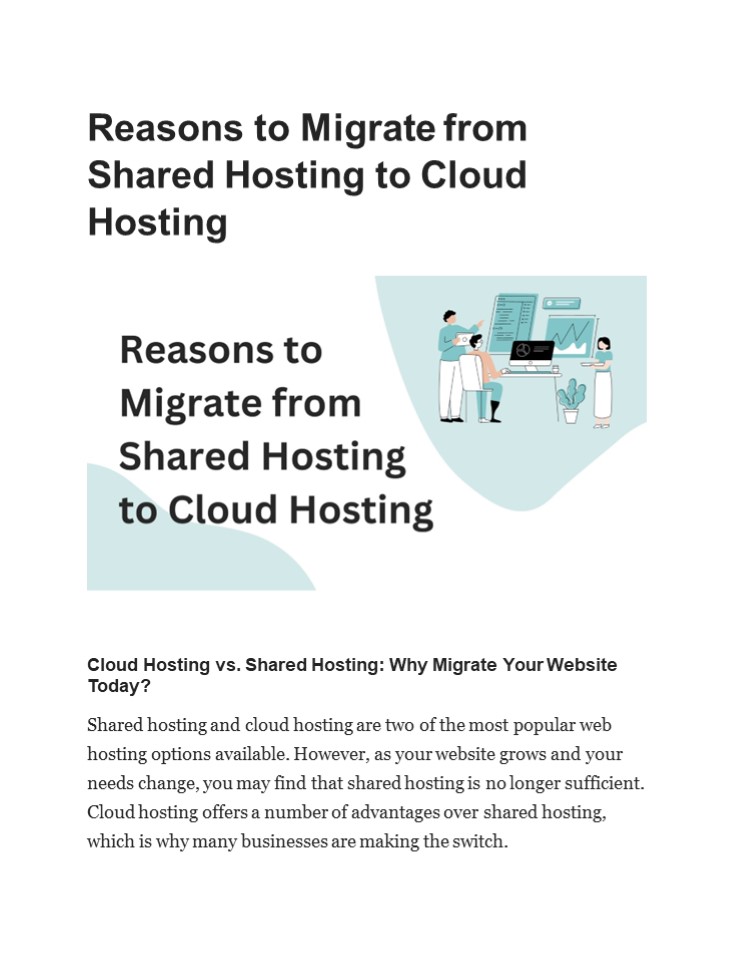Reasons to Migrate from Shared Hosting to Cloud Hosting - PowerPoint PPT Presentation
Title: Reasons to Migrate from Shared Hosting to Cloud Hosting
1
Reasons to Migrate from Shared Hosting to Cloud
Hosting
Cloud Hosting vs. Shared Hosting Why Migrate
Your Website Today? Shared hosting and cloud
hosting are two of the most popular web hosting
options available. However, as your website grows
and your needs change, you may find that shared
hosting is no longer sufficient. Cloud hosting
offers a number of advantages over shared
hosting, which is why many businesses are making
the switch.
2
- Related Benefits of Managed Cloud Services
- What is Shared Hosting?
- Shared hosting is a type of web hosting where
multiple websites share the same physical
server. This can be an affordable web hosting
option for small or entry level websites with
low traffic. However, there are a number of
drawbacks to shared hosting, including - Limited resources Each website on a shared
server shares the same pool of resources, such
as CPU, RAM, and storage. This can lead to
performance problems if one website starts using
a lot of resources. - Security concerns Because multiple websites
share the same server, there is a greater risk
of one website being hacked and compromising the
security of other websites on the server. - Scalability limitations It can be difficult to
scale your website on a shared server. If your
website starts to experience unexpected growth,
you may need to upgrade to a new server, which
can be disruptive and expensive. - What is Cloud Hosting?
- Cloud hosting is a type of web hosting where your
website is hosted on a network of servers. This
network of servers is called a cloud because
it is distributed across multiple datacentres
around the
3
- world. Cloud hosting offers a number of
advantages over shared hosting, including - Increased resources Cloud hosting gives you
access to a virtually unlimited pool of
resources. This means that you can easily scale
your website up or down to meet your needs. - Improved performance Cloud hosting typically
offers better performance than shared hosting.
This is because your website is not competing
with other websites for resources. - Enhanced security Cloud hosting providers
typically offer a number of security features,
such as firewalls and intrusion detection
systems, to help protect your website from
attack. - Greater scalability Cloud hosting is highly
scalable. You can easily add or remove resources
as needed, without having to upgrade to a new
server. - Related What is Cloud Hosting?
- Reasons to Migrate from Shared Hosting to Cloud
Hosting - There are a number of reasons why you might want
to migrate your website from shared hosting to
cloud hosting. Here are just a few - Your website is growing If your website is
experiencing steady growth, it is likely to
outgrow its shared hosting plan.
4
- Cloud hosting can provide the resources you need
to accommodate your growing website. - You need better performance If your website is
slow or unreliable, cloud hosting can help to
improve its performance. - You are concerned about security If you are
concerned about the security of your website,
cloud hosting can provide you with peace of
mind. - You need more flexibility Cloud hosting offers a
great deal of flexibility. You can easily scale
your website up or down, and you can add or
remove features as needed. - How to Migrate from Shared Hosting to Cloud
Hosting - Migrating your website from shared hosting to
cloud hosting can be a complex process. However,
there are a number of resources available to
help you make the transition smoothly. Many cloud
hosting providers offer migration services that
can help you move your website to the cloud. You
can also find a number of tutorials and guides
online that can walk you through the process of
migrating your website yourself. - Conclusion
- If you are considering migrating your website
from shared hosting to cloud hosting, I
encourage you to do your research and weigh the
pros
5
and cons. Cloud hosting can offer a number of
advantages over shared hosting, and it may be
the right choice for your website.







![[Latest Update] CompTIA CV0-003 Actual Exam Practice Questions Shared Online PowerPoint PPT Presentation](https://s3.amazonaws.com/images.powershow.com/10140967.th0.jpg?_=20240927017)























